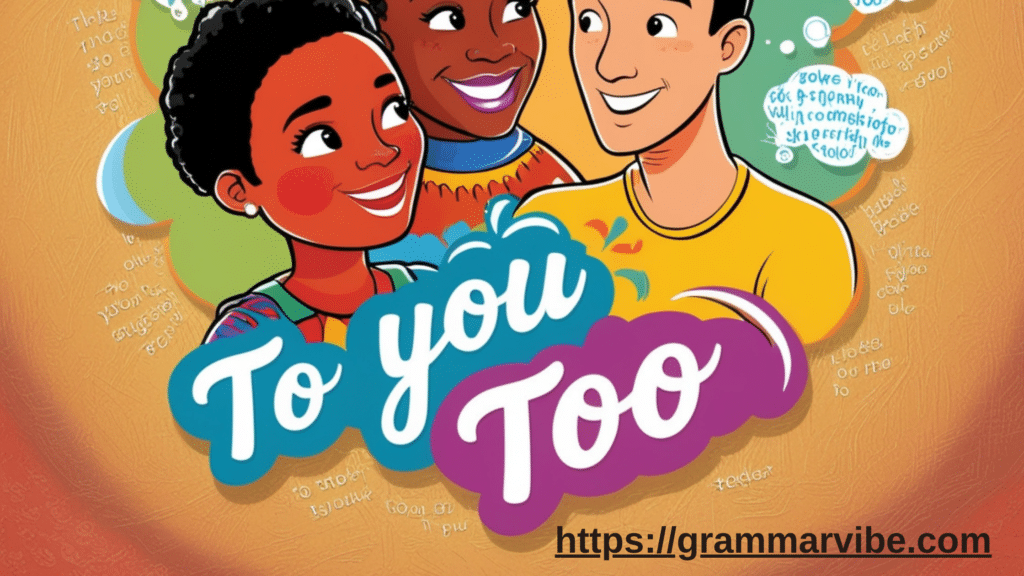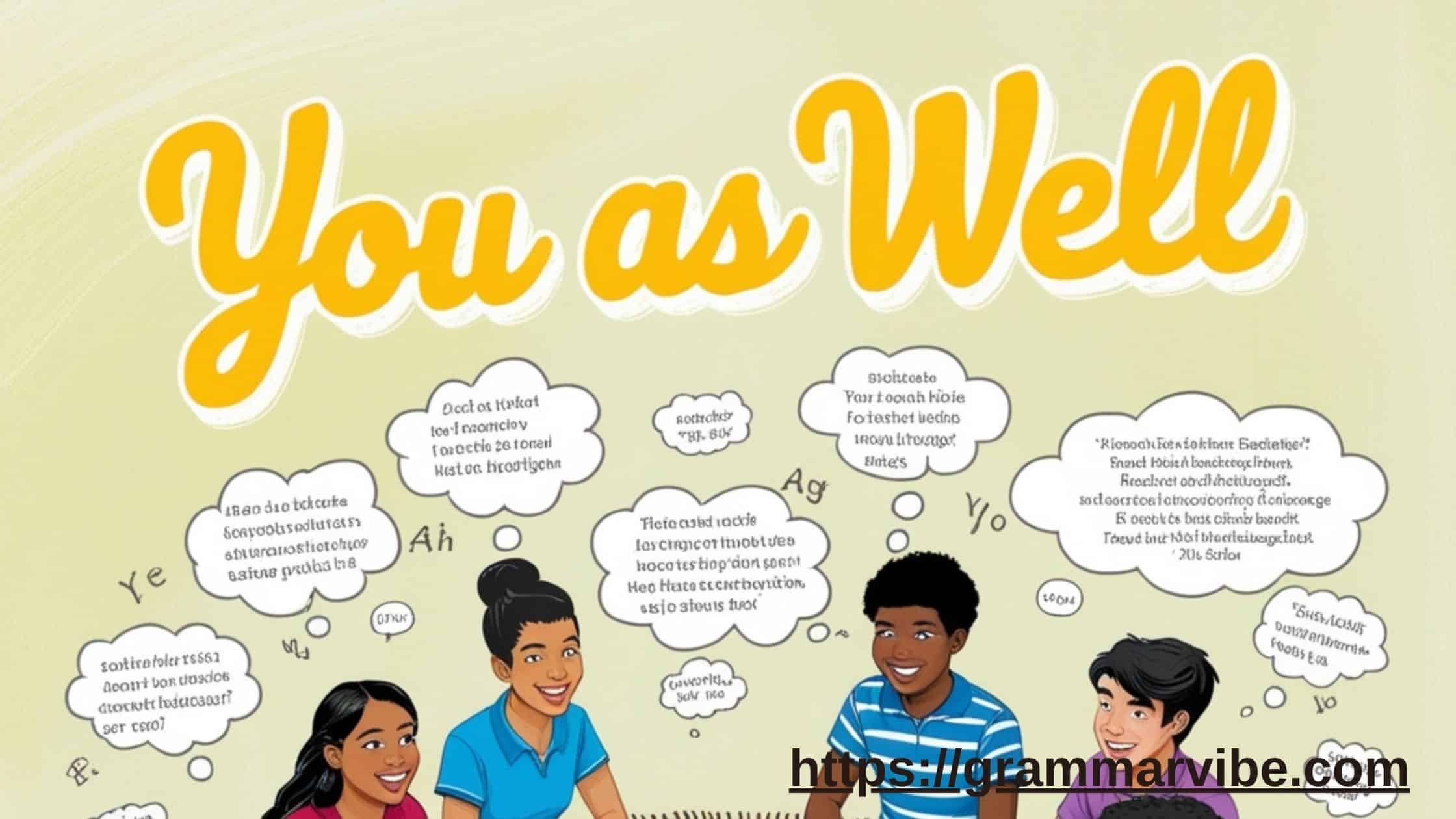When engaging in conversations or exchanging emails, we often find ourselves using the same common phrases over and over again. One such phrase that tends to pop up frequently is “You as well”. While it’s grammatically correct and polite, it can sound somewhat stiff and repetitive in both everyday conversations and written communication. That’s why it’s useful to have alternative expressions to make your responses sound more natural and varied.
Here, we’ll dive into 15 creative alternatives to saying “you as well.” These expressions range from casual phrases to more formal responses, and each comes with practical examples for use in different contexts. Whether you’re replying to a colleague’s email or wishing someone well during a conversation, this list will help you expand your vocabulary and make your interactions feel fresher and more engaging.
Why Should You Use Alternatives to “You As Well”?
It’s easy to fall into the habit of using certain phrases, especially in repetitive situations like responding to greetings or well-wishes. However, sticking to the same idiomatic phrase can make your communication sound monotonous and predictable. By incorporating alternative expressions, you add variety to your speech and writing, which can help improve writing flow and communication habits.
For example, imagine you’re ending an email to a colleague who wishes you success. Saying “You as well” in reply is perfectly acceptable, but wouldn’t it sound better to use something that conveys a more personal touch? Plus, switching things up adds an element of writing sophistication.
Let’s explore 15 alternative ways to say “You as well” in different contexts.
1. You Too
“You too” is by far the most common and simple alternative to “You as well.” It is casual, friendly, and easy to use in everyday conversations. This expression is perfect for responding to greetings or well-wishes, especially when speaking to friends or family.
Example:
- “Good luck with your presentation!” – “You too!”
This phrase works in both written communication and speech, whether you’re texting a friend or replying to a colleague.
2. The Same to You
This is a slightly more formal option than “you too” but still casual enough for daily use. It’s a great way to mirror someone’s well-wishes without sounding too stiff.
Example:
- “Have a fantastic weekend!” – “The same to you!”
This expression works well in both casual conversation and email sign-offs when you want to convey politeness without overdoing it.
3. To You Too

If you want to emphasize the recipient of the message, “to you too” can be an effective alternative. It’s similar to “you too” but shifts the focus a bit more on the person you’re responding to.
Example:
- “I hope you enjoy your vacation!” – “To you too!”
This phrase fits nicely into conversational sign-offs and can also be used in email responses where you’re wishing someone well after they’ve done the same for you.
4. And to You
“And to you” is a more formal response, making it ideal for situations where you need to maintain a polite, professional tone. It works best in settings like business emails or formal conversations.
Example:
- “I hope your meeting goes well!” – “And to you!”
This expression provides a touch of elegance to your reply, offering a refined farewell while still conveying well-wishing.
5. And You, Of Course
This phrase is warm and friendly, and adds a bit of enthusiasm to your response. It’s a great way to convey your well-wishes while sounding more approachable.
Example:
- “Have a wonderful holiday season!” – “And you, of course!”
Use this in casual conversations or to close emails with a more personal tone.
More for you: 15 Other Ways to Say “Happy to Help”
6. Wishing You the Best in Return
For a slightly more formal tone, “wishing you the best in return” is a polite yet sincere way to wish someone well. It’s suitable for both written responses and professional settings.
Example:
- “It was a pleasure working with you.” – “Wishing you the best in return.”
This phrase is ideal for email sign-offs when you want to express your gratitude or good wishes after a work interaction.
7. I Hope You Have a Good One Too
Casual and friendly, this response is perfect for situations where you want to sound conversational. It’s especially good when responding to someone who’s wishing you well in a laid-back manner.
Example:
- “Have a great day!” – “I hope you have a good one too!”
This phrase works well in text messages, emails, and even face-to-face conversations.
8. The Feeling Is Mutual
If someone expresses appreciation or positive thoughts towards you, you can reply with “the feeling is mutual” to convey that you share the same sentiment. This phrase suggests reciprocity and makes the exchange feel more personal.
Example:
- “I’m grateful for your help.” – “The feeling is mutual!”
This alternative works well in both professional and informal contexts, such as when thanking a colleague or friend.
For your interest: 15 Other Ways to Say “You’re Proud of Someone”
9. Right Back at You
“Right back at you” is an informal, playful phrase that works well in casual settings. It’s a fun and light-hearted way to return well-wishes and is commonly used in text exchanges and social media responses.
Example:
- “Good luck with your project!” – “Right back at you!”
This phrase adds a bit of humor and energy to the exchange, making it ideal for close friends or casual acquaintances.
10. Same to You, My Friend
This alternative adds an extra layer of warmth and friendliness. It’s especially effective when you’re speaking to someone with whom you share a close connection, such as a friend or long-time colleague.
Example:
- “Take care of yourself!” – “Same to you, my friend!”
It’s a simple but effective way to end a conversation or email on a positive note while reinforcing the relationship.
You might also like: 15 Other Ways to Say “Sounds Good”
11. All the Best
This is a concise and polite phrase that is often used in professional settings. While it’s a bit formal, it works well when you want to express good wishes without sounding overly casual.
Example:
- “I hope your new job goes well!” – “All the best!”
This is a great way to offer well-wishes in professional emails or formal messages.
12. Cheers

Commonly used in British English, “cheers” is an informal way of saying “thank you” or wishing someone well. It’s especially popular in social media exchanges and among friends.
Example:
- “Thanks for the help today!” – “Cheers!”
While it’s casual, it’s widely accepted in a variety of contexts, from text messages to social interactions.
13. Take Care
“Take care” is an expression used to wish someone well, typically when parting ways. It’s informal, but it carries a sense of warmth and sincerity.
Example:
- “See you soon!” – “Take care!”
This is perfect for casual conversations and works well in written responses, particularly when you want to show you genuinely care.
14. Best Wishes
“Best wishes” is a classic and formal way of wishing someone well. It can be used in both personal and professional contexts, and it works great as a closing remark in formal letters and emails.
Example:
- “I hope everything goes smoothly with your presentation!” – “Best wishes!”
It’s a safe option when you want to be polite and respectful, whether in a business email or a more formal setting.
Check out this: 15 Other Ways to Say “Please See Attached” in Email
15. Have a Good One
This is a casual and friendly phrase commonly used to end a conversation or email on a positive note. It’s ideal for informal settings and works well when responding to someone wishing you well.
Example:
- “Enjoy your day!” – “Have a good one!”
This expression works best in casual conversations and text messages when you want to keep the tone light-hearted.
Summary of the 15 alternatives to “you as well”:
| Alternative Phrase | Context | Tone |
|---|---|---|
| You too | Casual | Friendly |
| The same to you | Slightly formal | Polite |
| To you too | Casual, recipient-focused | Warm, friendly |
| And to you | Formal | Elegant, refined |
| And you, of course | Friendly, warm | Enthusiastic |
| Wishing you the best in return | Formal, sincere | Polite |
| I hope you have a good one too | Casual, friendly | Light-hearted |
| The feeling is mutual | Shared sentiment | Warm, sincere |
| Right back at you | Playful, informal | Friendly |
| Same to you, my friend | Close relationship | Warm, personal |
| All the best | Formal, professional | Polite |
| Cheers | Informal, British | Casual |
| Take care | Informal | Caring |
| Best wishes | Formal, professional | Polite |
| Have a good one | Casual | Friendly |
Conclusion
In conclusion, having a variety of ways to say “you as well” can make your conversations and writing more interesting. It helps you avoid repetition and adds personality to your responses. Whether in casual chats or formal emails, these alternatives can improve your communication style.
By using phrases like “the same to you” or “right back at you,” you can sound more natural and connected. So, next time, try these fresh substitutes and enhance your everyday communication!

Kyren Paul is an experienced blogger and the creative mind behind “Grammar Vibe.” With a passion for the nuances of English grammar, he brings clarity and insight to everyday language topics, making grammar accessible and engaging for readers of all levels.









Leave a Comment